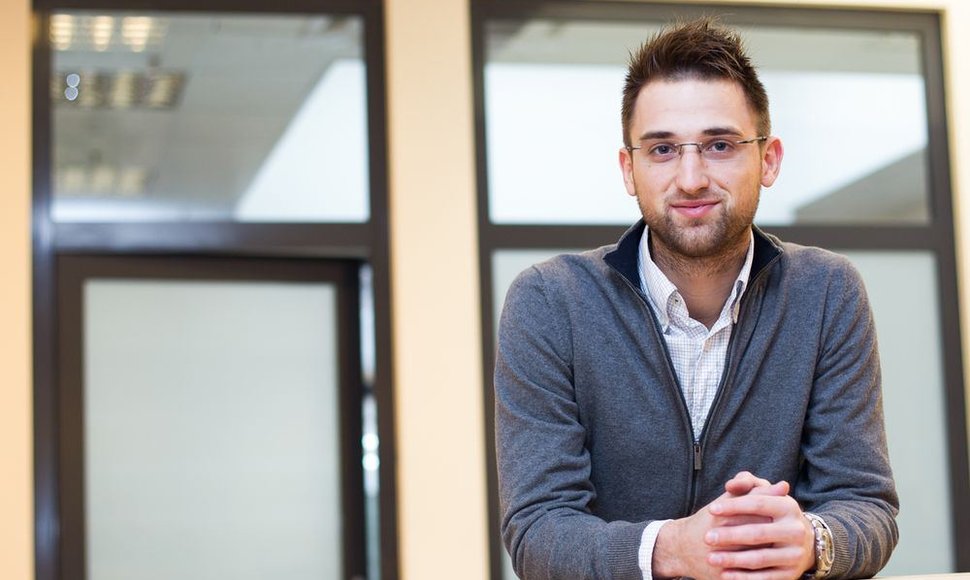In the experience of Vidmantas Veikalas, director of the company Open24 that has just opened a shoe store in Copenhagen, working with Denmark's Lithuanians is incomparably easier than buying services from Danes themselves.
“I was very pressed by store opening deadlines, so I had an excellent opportunity to learn that Danes don't like to rush, they avoid tensions – and practically refuse to accept someone else's stress. At one point in the process of building a company in Denmark, I made a half-conscious decision to rely on Lithuanian resources – work with contractors in Lithuania or Denmark's Lithuanians as much as possible,” Veikalas says.
Cosmic prices
Veikalas has recently opened a CROCS shoe store in a big Copenhagen mall. All furniture and even banners were made in Lithuania.
“In Lithuania, when a company requires a credit card reader, you just call a bank, sign a request and, the following day, you have it. Meanwhile in Denmark, you must go to an intermediary, fill out special blanks, sign a contract – issuing a card reader takes at least a week. Installing internet in a shop takes a month. If something breaks down, you either pay big money to have it fixed, or you're told “we'll fix it” and then wait for ages,” Veikalas smiles.
So he hired Denmark-based Lithuanians to do all installation work in the shop – their contact details were helpfully provided by consultants at Enterprise Lithuania, a government business promotion agency.
“As I was talking to Danes, I realized how different our mentalities were: I tell them one thing and they hear something else. With Lithuanians, things are clear and easy. Construction works moved from the dead point the moment I contracted a Lithuanian construction company in Denmark. I was very happy with the result – the quality of work, dedication, speed, and, of course, the price of their services. In terms of pay, offers from Danish companies were cosmic,” Veikalas admits. He now has an extensive directory of contacts of Lithuanians in Denmark – from construction workers to providers of services of all kinds.
Only half of stock in shelves
The Lithuanian business, opened in Copenhagen only several months ago, is gradually gaining momentum, but the beginning was challenging enough. For example, the shop opening was planned for Friday, but it was a day and a half late, because shop assistants did not put the products on shelves in time.
“I had to fly back to Lithuania, so I gave orders to my employees to bring the stock from the warehouse and put everything on shelves. They say: No problem – have a nice trip! After landing in Vilnius, I call them and ask – how is it going? They say: Great! I ask them to send me pictures to see how it all looks. They get evasive: Well, the working hours are over, we'll do it tomorrow. Nor was the shop opened the following day. And when it finally did open, only half of our products were on shelves. I have stocked shelves myself, so I know how long it takes for one person to do it. And they were four,” Veikalas wonders.
He does not think Danish employees are absent-minded. They simply have a different attitude towards work. Particularly to low-paid work.
Minimum wages for showing up at work
Veikalas pays his shop assistants the minimum rate – 128 kroner (59 litas) per hour. Danes work 37 hours per week, so their minimum monthly salary, before taxes, is about 8700 litas or about four times the average salary in Lithuania.
“In Denmark, an employee is like a small company – you pay them for services and then they take care of taxes themselves. But this is how they see this salary: I have come to work. If you want me to be more active, to service clients more vigorously, pay me more,” Veikalas says.
When the shop opened, he first hired a Danish employee to manage it. Now, however, a Lithuanian has replaced her in the job. Danish shop consultants were replaced too, by a Lithuanian, a Russian, and a Pole.
“Danes are pleasant people, they smile a lot, but they are not very motivated. Meanwhile Lithuanians, Russians, and Poles are very hard-working, dedicated, and responsible – they deliver more than you expect,” according to Veikalas.
He turned to employment agencies to look for Danish employees. Meanwhile his Lithuanian employees came through community contacts.
“It wasn't easy, since I needed people who spoke Danish. Students who come here to study usually get away with English.
“One of our employees has been taking Danish language courses for two years, but he hadn't had much opportunity to practise, so the beginning was difficult. But three months later and he communicates excellently – that's what good motivation can do,” Veikalas notes. He believes that one of the reasons why he failed to come to an understanding with Danes was their attitude towards him as their boss: “It was they who used to hire Eastern Europeans to work for them, and now a Lithuanian company comes to their country and hires them.”
Encouraging cooperation
Danguolė Gailevičiūtė, Enterprise Lithuania representative in Denmark:
„We are usually contacted by companies that want to export their products. However, more and more entrepreneurs want to enter the market directly.
„When a Lithuanian company decided to enter the Danish market, I always inform them about possibilities of hiring Lithuanian labour, I introduce them to LYS.lt, a Lithuanian youth organization, etc. From what I know, there are some 1,200 young people from Lithuania who are currently studying in Denmark.
„When you're entering a new market, it always helps to have someone who can understand you in your mother tongue. Enterprise Lithuania wants to see Lithuanian-capital companies cooperate with one another and present new and competitive products on the market.
„It is hardly a secret that, in Denmark, everyone is rather reluctant to waste time on small providers whose reliability has not been proven yet – therefore it is near-impossible for a small enterprise to have a break-through without some help.“













